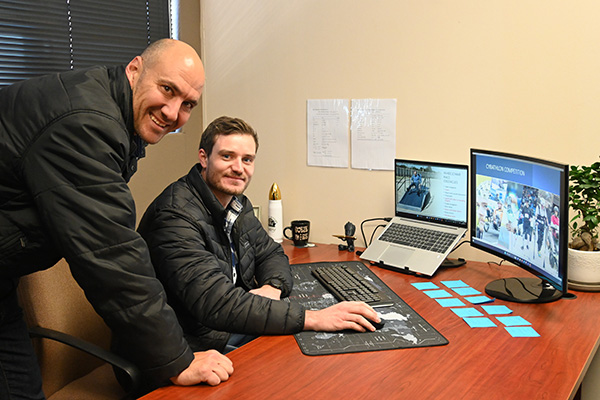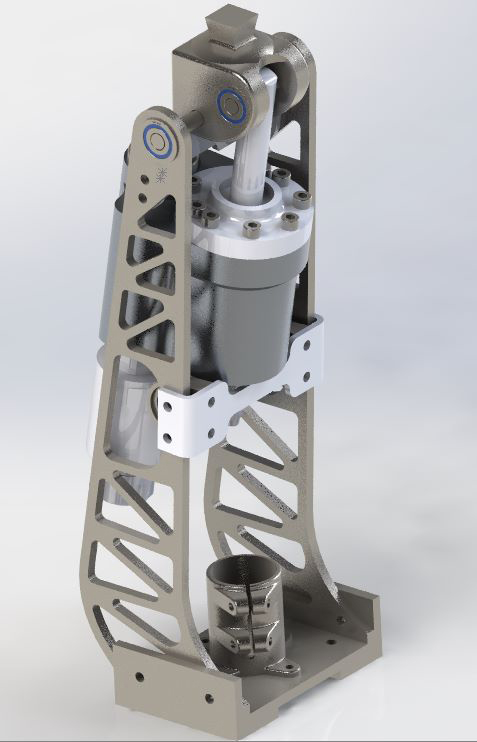Zürich 2024, here we come, complete with a state-of-the-art prosthetic leg and wheelchair.
Headed by the formidable North-West University (NWU) team of Prof André Grobler and Ian Thomson from the Faculty of Engineering and Dr Mark Kramer from Health Sciences, the innovators are preparing to take the fruits of their research and designs in digital health to the international stage.
They will be competing at the 2024 Cybathlon competition* in Switzerland. This competition, in the form of a gruelling race, will take place in Kloten near Zürich in October next year.
The multidisciplinary team comprises dedicated students from diverse backgrounds who share the common goal of developing a cutting-edge prosthetic leg and wheelchair for the race. Through their participation they will not only showcase their innovations, but also promote inclusivity for people with disabilities.
“We are busy designing devices that are efficient, user-friendly and able to withstand the rigorous demands of the competition,” says Prof Grobler. “We believe our designs have the potential to transform the lives of those living with mobility impairments, not only locally and in Africa, but also internationally. Designing life-changing innovations is a team effort. In this regard we cherish our collaboration with the Physical Activity, Sport and Recreation (PhASRec) research focus area at Health Sciences, especially with regard to the contribution relating to the biomechanical aspects of movement provided by Dr Kramer.”
Walking the talk and rolling towards success
The team has put a lot of work into the development of the prosthetic leg. This is currently in progress and involves various projects.
These projects are focused on the socket, knee, ankle and foot respectively. Ian says they are using 3D printing for the socket, which is the part of the prosthesis that fits onto the stump of an amputated limb.
He describes the knee as the brain of the prosthesis and the most difficult part to design. The knee should be able to carry the competitor quickly and easily over obstacles, which is crucial if they hope to be competitive during the race.
The ankle is designed to simulate natural ankle movement and adjusts according to the terrain. Blade designs are used for the foot, with additional projects focusing on electronics, fittings and swivels for the prosthesis.
There are two versions of the new wheelchair.
The first is a 4X4-type wheelchair that is able to function on even the most challenging surfaces. The second is a wheelchair that opens doors with the aid of a robotic arm, climbs steps with a sickle-type design on its wheels, and even navigates.
It started a while ago …
Prof Grobler says they are building on the work and innovations of Prof Leenta Grobler, who laid the groundwork before the Covid-19 pandemic. She has since left the faculty and joined the NWU Business School.
Ian used to be one of her master’s-degree students. At the time, he worked on one of the innovations – a knee-function-monitoring device – which inspired him to focus on other innovations in the rehabilitation environment.
Having lost his leg in a motorbike accident when he was 16, he knows the challenges people with disabilities face on a daily basis. Together with the NWU’s Cybathlon team, he is developing a powered prosthesis that is an affordable and life-changing innovation for anyone who has to wear a prosthesis.
To Cybathlon 2024 and beyond
Both Prof Grobler and Ian are very excited about the future of digital health technologies. “We aim to produce innovations that are geared towards solving actual challenges at a fraction of the cost of the products that are currently available,” says Prof Grobler.
What makes their innovations even more remarkable is that they are created with basic equipment. “We do not have access to all the state-of-the-art resources that are available overseas. This has taught us to innovate in such a way that we can rival other designs effectively.”
Ian says persons living with disabilities are involved in the testing of the innovations. “As they will be the end-users, the designs must be effective in addressing their needs and improving their quality of life.”
Although preparing for Cybathlon 2024 is currently the NWU team’s priority, they have already started planning and identifying projects for subsequent Cybathlons.
“Watch this space, there are more groundbreaking innovations on the way,” says Prof Grobler.
*The Cybathlon is a unique international competition that brings together people with disabilities, engineers and scientists to develop and test the latest assistive technologies.

Prof André Grobler and Ian Thomson are excited to participate in the next Cybathlon. “The NWU’s multidisciplinary team is taking up the challenge to place the NWU at the forefront of digital health solutions,” says Prof Grobler.

One of the designs that is currently being developed by the team.
